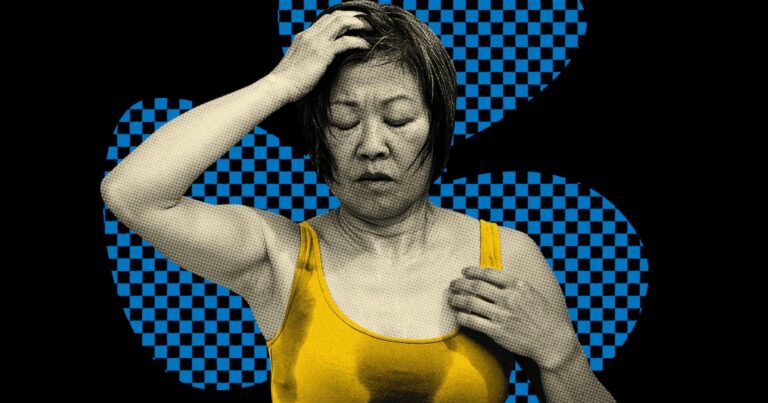
[ad_1]
A few years ago, I started running with a woman who was in her late 40s, just a few years older than I was at the time (and the age I am now). She often talked about how she’d fall asleep early from pure exhaustion only to wake up at one o’clock in the morning and be wide awake for a few hours.
She told me it started gradually in her early 40s — a rough night here and there, with trouble getting to sleep or falling back asleep. “I thought it was me or something I was doing,” she told me. She’d tried a sleeping aid and cut out caffeine, but nothing helped.
When she finally went to her doctor, he told her a lot of it was thanks to hormonal changes as she hit menopause. She told me that I might experience to the same thing. I was 43 at the time and I was skeptical. I’ve always been someone who slept a lot and rarely had any issues.
Well, I was wrong.
Around the age of 46, I started waking up at night so hot, even in the winter. I’ve always been someone with bad circulation and used an extra blanket to sleep at night. I figured it was a fluke, but it wasn’t. Night sweats turned into full-blown hot flashes that year, and it really wrecked my sleep. I started sleeping naked, got a cooling mattress and sheets, and started taking vitamin E after reading a study that said it helped women with hot flashes. Thankfully, it really worked for me.
Once I got that under control, I thought the sleep would come back. Wrong again! I’m almost 48 and I’m still over the place. Getting enough sleep has almost become an obsession of mine; I know how miserable I act and feel when I don’t get enough.
If I wake up at night to use the bathroom, it sometimes takes me hours to fall back asleep. And we all know how badly a mother’s head can spin and overthink while the rest of the house is asleep.
I don’t think I would have known how bad it could get, had my friend not given me fair warning, because no one else ever told me about it — not even my own gynecologist.
Curious to know more, I reached out to Dr. Joy’El Ballard, a board-certified OB/GYN and business coach for midlife women, to know more. Ballard told me that sleep disturbances are common during menopause thanks to a decline in estrogen and progesterone. “Progesterone has a sleep-inducing effect on brain pathways so when it declines, some women can have sleep disturbances,” Ballard told me. “When estrogen declines, it can cause the common menopausal symptoms, [such as] hot flashes, and night sweats.”
Of course, it’s easy to recommend some things to get better sleep, especially coming from a doctor. Things like turning off devices, avoiding caffeine and having a consistent bedtime (and what mom has that?).
I’ve found a few things that work really well. I take a vitamin E capsule with dinner. I no longer fall asleep on the sofa any longer (something I used to do nightly) because I really struggle to fall back asleep when I get to my bed. I read when I get in bed and stay off my phone. I also take magnesium every night before heading upstairs and keep a lavender essential oil roller by my bed. I always apply it behind my ears, on my stomach, and behind my ankles.
Following a routine has really helped. But I still have one or two nights every few months where I wake up a lot. I also notice if I skip any of my “steps” it affects my sleep and I pay for it later.
I’m so glad my friend warned me about what was to come. Here’s hoping you’re a bit more prepared than I was.
Katie Bingham-Smith is a full-time freelance writer living in Maine with her three teens and two ducks. When she’s not writing she’s probably spending too much money online and drinking Coke Zero.
[ad_2]